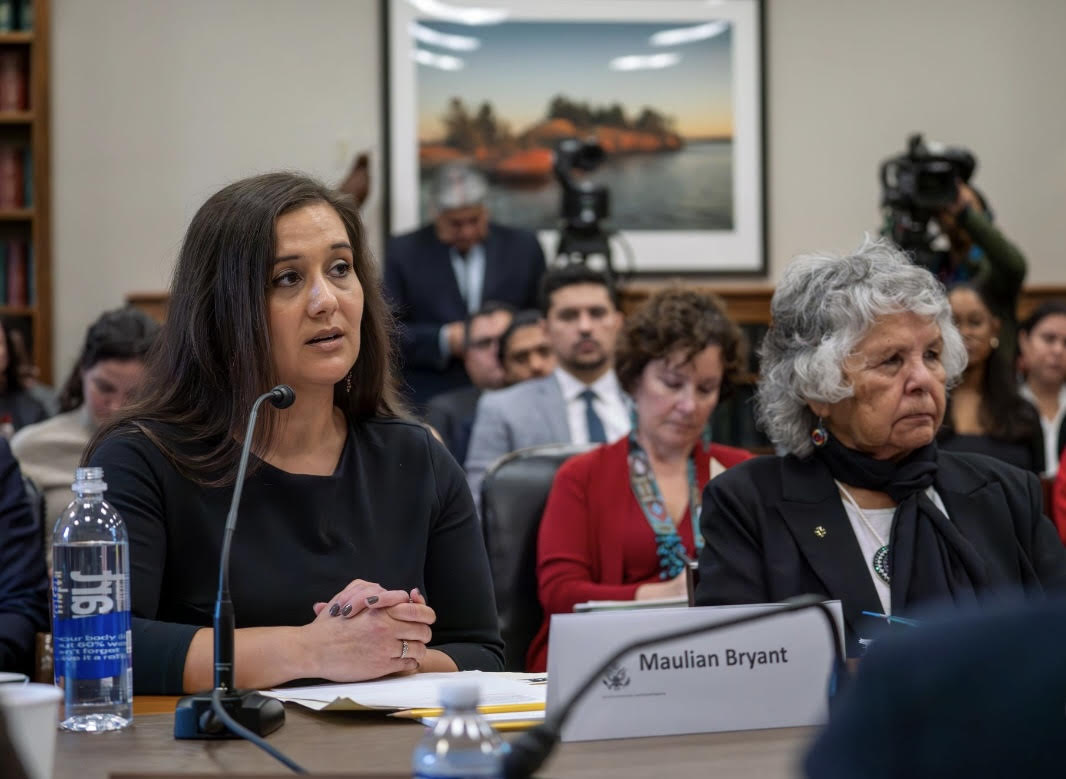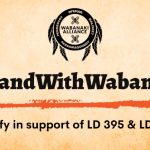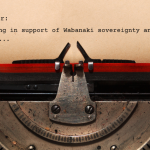Note: Read the full testimony HERE and watch a recording of the hearing a HERE.
WASHINGTON, DC — Wabanaki Alliance Executive Director Maulian Bryant testified along with other Indigenous women leaders to the Subcommittee on Interior, Environment, and Related Agencies of the US House Committee on Appropriations, US House of Representatives, at a hearing November 20 to address the crisis of murdered & missing persons declaring, “The reasons for this crisis are threefold: societal indifference, jurisdiction and coordination issues, and a lack of support and funding for tribal law enforcement agencies.”
Bryant presented alarming information concerning the prevalence of violence directed against Indigenous women and girls and the confounding jurisdictional issues that impede decisive action to stop the violence and to hold the perpetrators accountable. “One in three Indigenous women, statistically speaking, will be the victim of a violent crime in her lifetime. There are four of us in my immediate family.”
She spoke to members of the Subcommittee on Interior, Environment, and Related Agencies as they conducted a hearing titled “Investigating the Crisis of Missing and Murdered Indigenous Women.” Representative Chellie Pingree, the ranking member of the House Committee on Appropriations, invited Bryant to address the body.
Among the contributing factors to the crisis cited by Bryant include negative stereotypes of Indigenous girls and women. “These stereotypes and false portrayals of our people that I have articulated serve to dehumanize us and freeze us into an image or idea instead of giving space to the full and vast reality of who we are.” She explained how these harmful stereotypes objectify and minimize the visibility and real experience of Indigenous women leading to less awareness for MMIW cases. “When an Indigenous woman goes missing there is not the same attention and action as when a Caucasian woman is.”
Bryant identified the 1980 Maine Indian Claims Settlement and Implementing Acts as having blocked the Penobscot Nation from exercising jurisdiction to act against violence perpetrators.
“It took us many years but we were able to work towards a state statute granting us VAWA jurisdiction and we also worked with our delegation, Representative Pingree included who is always a steadfast advocate for us, to be mentioned in the most recent federal reauthorization. Now tribes with tribal courts in Maine have access to this important law when the crimes occur in our jurisdiction.” VAWA is the acronym for the Violence Against Women Act initially passed in 1994 and most recently reauthorized in 2022. VAWA represented the first federal legislative effort to end violence against women.
Bryant concluded her testimony urging the committee members to support “Funding the key programs for our people in the Interior budget and upholding the trust responsibility helps our communities in terms of health, stewardship of natural resources, public safety, and keeping our communal and cultural connections strong. All of the appropriations decisions you all make here impacts the MMIW crisis because in order for our people to protect each other and heal from past trauma we need to have resources and means to survive.”
Read the testimony by Executive Director Maulian Bryant
Chairman Simpson, Ranking Member Pingree, and honorable members of the committee. We appreciate you holding this hearing and giving space for us to reflect on this crisis and collaborate with you on ways to go forward together. I have served as the Tribal Ambassador for my Tribal Nation for over seven years and I will soon advocate for all of the Wabanaki Tribes in Maine as the incoming Executive Director for the Wabanaki Alliance.
I am a mother to three daughters. Iris who is 2, Layla who is 15, and Carmella who just turned 18. Thinking about their safety and wellbeing has driven much of my work and advocacy on the issue of Missing and Murdered Indigenous Women and People. One in three Indigenous women will be the victim of a violent crime in her lifetime. There are four of us in my immediate family.
The societal component of this crisis, and why it has been so hard to combat and address, cannot be overlooked. When I was young and saw the Walt Disney movie Peter Pan, it was the first time I can recall seeing stereotypes about my people. The “Indian Encampment” scene and the use of the stereotypes around tribal women are a sad example. Tiger Lily, the Indian Princess, is no doubt a child yet made to look older and exotic and tempting. The older woman in camp is brash and mean and called a racial slur. Even the Disney version of Pocahontas, which tells a story meant to portray progress and honor, gets it wrong. Pocahontas was likely 14 when she met the English soldiers. She was taken to Europe where she died of disease away from her family, culture, and homelands. Both of these stereotypes have broadly applicable implications and unfortunately have been propagated throughout our society.
A lot of our experience as real Indigenous women through the generations has been minimized and at times silenced altogether while Americans embraced these false creations of us instead of seeing us as real people. Candy coating it does not make it better. It makes us more invisible.
When an Indigenous woman goes missing there is not the same attention and action as when a caucasian woman is. The primary reasons for this are three-fold: societal indifference, jurisdictional and coordination issues, and a lack of resources for tribal law enforcement agencies.
The false conceptions of our people often lead to victim blaming and attitudes that minimize attention given to MMIP cases. If an Indigenous woman was missing from a bar or a boyfriend’s home or if she has addiction issues or family issues she is often seen as putting herself in harm’s way and there is a dismissive approach at times. It is a fact that lots of negative behaviors and dysfunction are a lasting consequence of the horrors inflicted on our people in the colonization of this country be it the land theft, pandemics, residential school policy, outlawing of our religion, etc. We are real people deserving of equal rights and treatment.
Jurisdictional issues are equally harmful. There needs to be clear duties and processes delineated before, during, and after these crimes occur. Until recently, the Wabanaki people in Maine lacked equal access to the tribal provisions of the Violence Against Women Act due to our outdated and oppressive 1980 Maine Indian Claims Settlement Act. Fortunately, after years of work and support from Ranking Member Pingree, we were able to address this and now VAWA cases within the Penobscot Nation’s jurisdiction are being fully handled by the tribe. Ensuring that Indigenous people report the crimes and feel safe and supported doing so is also key because due to the lack of justice in many of these cases victims can feel like it is not worth the time or effort in an already traumatic time to take these steps.
Finally, our own tribal law enforcement agencies need additional support. While tribal law enforcement funding has increased in recent years, the increases are far from meeting the actual level of need. One of the largest barriers is actually the growth of unrelated line items connected with Contract Support Costs and 105(L) leases, which are taking up a larger and larger portion of Congress’s allocation towards our budgets. It is critical that these be moved to the mandatory side of the budget so that funding increases can go towards real program improvements and services, rather than fulfilling mandatory contract obligations.
In the time we have here together today I wanted to give a personal perspective as an Indigenous woman, mother, and leader. Funding the key programs for our people in the federal budget and upholding the trust responsibility helps our communities in terms of health, stewardship of natural resources, public safety, and keeping our communal and cultural connections strong. All of the appropriations decisions you all make here impacts the MMIW crisis because in order for our people to protect each other and heal from past trauma we need to have resources and means to survive.
Thank you so much for the invitation to come share here and I am happy to be in this work with you and to take any questions.
Watch the hearing
A House Appropriations subcommittee held a hearing on 11/20/24 to investigate the ongoing crisis of missing and murdered Indigenous women. Incoming Wabanaki Alliance Executive Director Maulian Bryant gave testimony at the hearing. To watch, click the icon in the center of the image below. Her testimony begins at 1:00:40.
Along with the other speakers providing testimony on this important issue, the highly substantive Q&A period begins after Bryant’s testimony, at 1:06:32.







